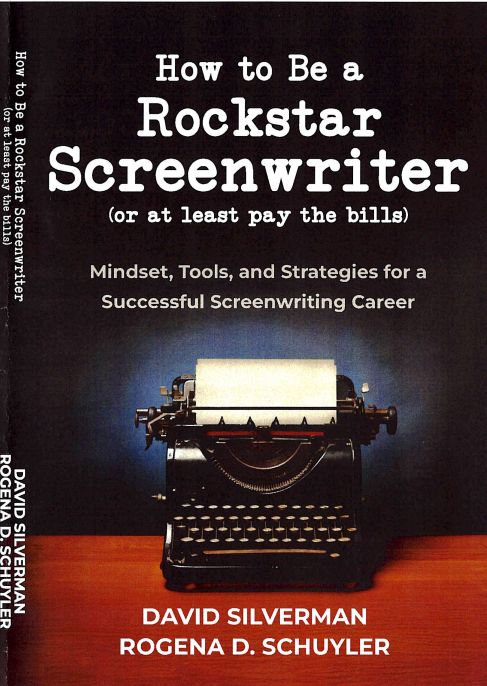One thing that can really help rookie, or working screenwriters, trying to sell features, is to read the spec scripts that the studios bought recently.
While I was researching where to find those scripts, I found this article by Eric Bork, a screenwriter and a blogger. He breaks down what the specs that sold had in common.
This blog was written back in 2012, but it’s still very relevant. In one respect the prospect of selling your spec script is worse today in 2016. (Sorry) So far (in April 2016) only 11 screenplays have been purchased by the studios or production companies.
Extrapolating, there will only be 33 screenplays bought this year. I want to re-iterate, spec scripts rarely get sold and produced.
Ninety percent of the time, the best outcome for a spec script is that it becomes a “calling card” script. It’s the script that gets you into meetings with producers, studio executives, agents or managers. You should be thinking along those lines. If you get those meetings, you’ve succeeded.
Back to 2012. 132 spec scripts sold. One thing all the spec scripts that sold had in common was they fit nicely into Save the Cat’s 10 Genres.
Here’s the list and the Save the Cat genres they represent.
We screenwriters want to sell our work, naturally. This, of course, is very rare. How rare? Well, in 2012, according to The Scoggins Report’s “Year-End Spec Market Scorecard”, there were 132 “spec sales” – or scripts that sold — in the entire year. And this matched a 15-year record HIGH from 2011. And this is not just studio sales – this includes all buyers who were known to have bought a spec screenplay from a writer, according to my friend Jason Scoggins’ research. (He’s been compiling this information – and making it available for free – for many years.)
But the point of this post is not to discourage you – as you consider how many tens of thousands of scripts did not sell, so that these 132 could. My point is to offer a few observations about those scripts that sold, and especially about their content – as evidenced by the logline and genre information the “Scorecard” includes.
I think reading these loglines can be incredibly helpful for aspiring professional screenwriters, to get a sense of what makes a marketable concept. It’s one thing to hear that “a great logline is important, and the first thing to focus on.” Which is true. It’s another to read the actual loglines of scripts that actually sold, in the last year.
Below are 10 examples, out of the 132. A few things jump out at me about these (and the larger list), besides the fact that they all have premises that are clear from the logline, and sound fresh, compelling and entertaining – like big challenges for a relatable main character.
1. The writers generally had both an agent and manager. These days, that seems typical. A manager might be easier to get, and can eventually lead you to an agent. Who is more directly involved in brokering a sale.
2. There aren’t a lot of straight dramas – only 8% of the 132. To sell, it’s important to have a very strong entertainment component, and dramas tend to feel more “flat” – even if they are well executed. So the sales included 27% thrillers, 22% action/adventure, and 21% comedies. Plus 11% sci-fi and 10% horror. Drama comes in dead last.
3. The concepts clearly read like a fresh twist on an established genre – not only the traditional definition of “genre” (comedy, thriller, etc.), but also the ten “genres” or types of stories that Blake Snyder identified in his Save the Cat books. These are my single favorite tool for screenwriters, and I strongly recommend writers know these types, and seek to write squarely within one of them, with every script.
When I watch movie trailers, it’s almost always very obvious that each film fits one of these genres. And I think it’s hard to find successful movies which don’t. On my website, I’ve recently added a modified PDF chart of the ten genres and fifty subgenres from the Save the Cat website, where I added additional recent and classic titles that I think fit each genre. I really believe every good and successful movie fits one of them.
Without further ado, here are the ten examples of 2012 spec sales, with my comments on their apparent Save the Cat genres, under each entry:
Dear Satan
Writer: Dan Ewen
Reps: APA (Chris Ridenhour, Will Lowery) and Elements Entertainment (Christopher Pratt)
Genre: Comedy
Buyer: Fox
Logline: Follows a young girl who accidentally misspells Santa and instead invites Satan to bring her a toy for Christmas.
Save the Cat genre: “OUT OF THE BOTTLE”: Where a “wish” leads to a magic “spell” that will complicate life greatly, and lead ultimately to an important “lesson”. As in Liar Liar, The Nutty Professor or The Change-Up.
2
Writer: Barry Levy
Reps: UTA (Charlie Ferraro, Keya Khayatian, David Park) and Evolution (Stephen Gates, Stephan Marks)
Buyer: Universal
Genre: Thriller
Logline: A New York detective must figure out which twin brother actually robbed a bank and stole sensitive counterfeiting information, when both confess to the crime.
Save the Cat genre: “WHYDUNIT”, which focuses on a “detective” of some sort, figuring out not just who did it, but why, which generally involves a “secret”, and a “dark turn”. As in L.A. Confidential, Chinatown or Mystic River.
52 Percent
Writer: Zina Zaflow
Reps: Chad Snopek Management (Chad Snopek)
Buyer: QED International
Genre: Romantic comedy
Logline: When a longtime married couple contemplates divorce, a clash develops between their daughter, who hopes for reconciliation, and a jaded young divorce attorney, who’s unwilling to lose a client without a fight.
Save the Cat genre: “BUDDY LOVE”: A romantic comedy about the attorney and daughter’s relationship (I presume), in which an “incomplete hero” meets their perfect “counterpart” (who we think they should end up with), but there’s a “complication” –something big that’s in the way of the relationship, which the movie mainly focuses on. As in Wedding Crashers, Pretty Woman or Brokeback Mountain.
Blood Mountain
Writer: Jonathan Stokes
Reps: UTA (Ramses Ishak, Michael Sheresky, Scott Carr, Geoff Morely) and Energy Entertainment (Brooklyn Weaver)
Buyer: Derby Street Films
Genre: Thriller
Logline: After his team is ambushed and killed in Pakistan, a young army ranger must escort the world’s most wanted terrorist over dangerous terrain in order to bring him to justice. While being hunted by both of their enemies, they must find a way to work together in order to survive.
Save the Cat genre: “GOLDEN FLEECE” (“Epic” subgenre): Where a “team” goes down a long “road”, toward an important “prize” – which will make their lives much better if they reach it, and much worse if they don’t. As in Saving Private Ryan, Star Wars or The Rock.
Cherries
Writers: Brian & Jim Kehoe
Reps: DMG Entertainment (Chris Fenton)
Buyer: Good Universe
Genre: Action comedy
Logline: Three naive dads band together to stop their high school sophomore daughters from making good on a prom night sex pact. “The Hangover” meets “Taken.”
Save the Cat genre: Also a “GOLDEN FLEECE” (“Buddy” subgenre): with a clear team, road, and prize – akin to The Hangover, Finding Nemo or The Wizard of Oz.
Lights Out
Writer: Jay Frasco
Reps: APA (Ryan Saul) and Festa Entertainment (Dannie Festa)
Buyer: Universal Pictures, SyFy Films
Genre: Sci-fi thriller
Logline: The story focuses on a teenage boy trapped in his house with his sister when a deadly intruder enters the home and “mysterious events” start to occur.
Save the Cat genre: “MONSTER IN THE HOUSE”: Where there is a constant life-and-death threat from a “monster” that our main characters are trapped in something akin to a “house” with — and it all began with some real or perceived “sin”. As in Alien, Fatal Attraction or Psycho.
The Counselor
Writer: Cormac McCarthy
Reps: ICM (Amanda “Binky” Urban, Ron Bernstein)
Buyer: Nick Wechsler Productions and Chockstone
Genre: Drama
Logline: Follows a respected lawyer who thinks he can dip a toe into the drug business without getting sucked in.
“Save the Cat genre: INSTITUTIONALIZED”: Where an individual gets mixed up with a “group” of some sort, with its own challenging and morally questionable culture, which leads them ultimately to have to make a “choice” and “sacrifice” around the question of staying with it, or turning against it. As in The Godfather, The Devil Wears Prada or One Flew Over the Cuckoo’s Nest.
Acolyte
Writer: Derek Kolstad
Reps: UTA (Charlie Ferraro) and New Wave Entertainment (Mike Goldberg, Josh Adler)
Buyer: Voltage Pictures
Genre: Thriller
Logline: Centers on a rogue government agency that blackmails ordinary citizens into committing acts of terror. The agency comes under attack when the wife of a retired operative is mistakenly kidnapped and the former operative sets out to take the agency down.
Save the Cat genre: “SUPERHERO”: Where a hero with a “special power” but also a “curse” of some kind (the former operative, in this case, it would seem) takes on a “nemesis”, in order to protect or help innocent others. As in Erin Brockovich, The Matrix or Harry Potter.
Son of a Bitch
Writer: Kelly Oxford
Reps: WME (Cliff Roberts, Lisa Harrison) and Anonymous Content (Steve Golin, Kelly Kohansky Roberts)
Buyer: Warner Bros.
Genre: Comedy
Logline: A popular party girl tries to maintain her image despite recently becoming pregnant.
Save the Cat genre: “RITE OF PASSAGE”: Where a relatable “life problem” inspires the main character to react in a “wrong way” – chasing an ill-advised goal, where complications ensue, until finally they fail and reach some level of “acceptance” of life as it is. As in Superbad, The War of the Roses or My Best Friend’s Wedding.
Not Safe For Work aka NSFW
Writers: Simon Boyes & Adam Mason
Reps: WME (Daniel Cohan) and Brucks Entertainment (Bryan Brucks)
Buyer: Universal
Genre: Thriller
Logline: A young paralegal is trapped in an office with a killer on a secret mission to destroy files and anyone who stands in his path.
Save the Cat genre: “DUDE WITH A PROBLEM”: Where an “innocent hero” finds that a “sudden event” turns into an adrenalized “life or death battle” that powers the rest of the movie. As in Die Hard, Misery or Apollo 13.
Just for completeness sake, the one Save the Cat genre not represented on this list is the “Fool Triumphant” – where a seeming naïve “fool” gets involved with a more worldly “establishment,” and goes through a “transmutation” that results in them triumphing over all – as in Legally Blonde, The 40-Year-Old Virgin and Forrest Gump.
– See more at: http://www.scriptmag.com/features/scripts-that-sold-in-2012-what-are-the-common-elements#sthash.QWxb9YF3.dpuf
Check out my website, HollywoodScriptWriting.Com. Find out why you absolutely need a professional Screenwriter/Producer’s feedback on your project. I’ve sold screenplays, rewritten scripts Steven Speilberg, created 5 TV series, and worked as a Story Analyst for the studios.


